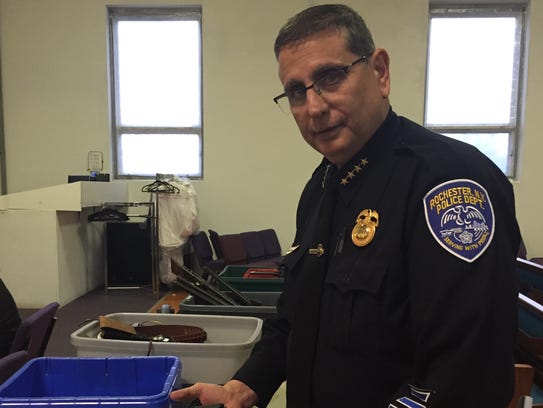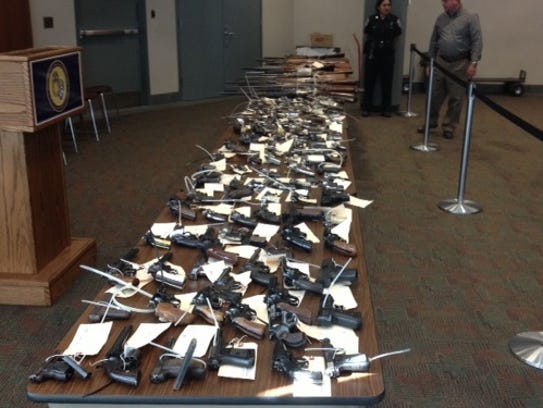PA Bill Number: SB1125
Title: Providing for welcoming schools.
Description: An Act amending the act of March 10, 1949 (P.L.30, No.14), known as the Public School Code of 1949, providing for welcoming schools.
Last Action: Referred to Education
Last Action Date: Dec 22, 2025
Gun buybacks popular, just may not reduce violence :: 10/13/2016
The stacks of guns make a dramatic photo opportunity at a press conference announcing the end of a gun buyback program. Handguns and rifles are splayed across a table as police talk about their efforts to reduce violence. It's visible evidence that they are taking guns off the streets and making the city safer.
But critics say such programs have little impact on reducing violence: They don't encroach on the individuals most likely to perpetrate violence, they collect guns that aren't likely to be used in the commission of a crime, and there's no clear data that the number of shootings drops after those guns are removed from the streets.
"Buybacks are among the least effective ways of reducing gun violence and are a distraction for the police," says Tom Reynolds, president of SCOPE-NY, a Second Amendment advocacy group. "The money would be better used in supporting police methods that identify high-risk individuals and intervene before the crimes happen."
Officials with the Rochester Police Department, which has conducted several buybacks in the past five years, acknowledge that the evidence on the programs' effectiveness is mixed. But they insist the events can play a small role in a broader anti-violence strategy.

Rochester Police Chief Michael Ciminelli displays a .22-caliber Jennings semiautomatic pistol turned in during the city's anonymous gun buyback program on Nov. 7, 2015. (Photo: Meaghan M. McDermott/ staff photographer)
A gun buyback event last November netted 228 functional guns, including an assault rifle. Rochester Police Chief Michael Ciminelli said he was pleased with the results.
"We did receive a number of illegally-owned handguns and some sawed-off shotguns, which we are very happy to get off the streets," he said. "There's no other purpose for a sawed-off shotgun or sawed-off rifle than to commit a violent crime."
The RPD will host another buyback at the end of this month at the Full Gospel Tabernacle Church in the city's northeast quadrant. It's an area that has seen more than it's share of shootings.
"We're right in the middle of a neighborhood that's been plagued by gun violence," said Pastor Ernest Walker, whose church is on Clifford Avenue between Joseph and Hudson Avenues. "We had a murder here a few days ago."
There have been more than eighty shootings within a half-mile radius of the church since 2011; fueled by the drug trade, gang rivalries and personal disputes.
Walker knows the skeptics don't think the buybacks will do anything to solve those problems, but he's convinced that they can make an impact.
"We want to get every illegal gun we can off the streets," Walker said. "If we get just one, that's significant, but we certainly hope to get more."
Research casts doubt
Buyback programs have surged in popularity across the country since the school shooting at Sandy Hook Elementary in Newton, Connecticut, in December 2012. New York's Attorney General Eric Schneiderman came to Rochester a few months later to announce his office would sponsor a statewide buyback program in cities across the state.
"By encouraging gun owners to turn in their weapons through our cash-for-guns program, we're removing deadly firearms from locations where they can be stolen or otherwise misused, keeping them out of the wrong hands," Schneiderman said.

Rochester police display the guns collected at one of their buyback events. (Photo: File photo)
Over the last three years, the Attorney General's Office has sponsored 11 buybacks across the state, purchasing 1,194 guns and paying out more than $65,000. Local police agencies sometimes contribute additional funding, and some have held additional buyback events without the AG's involvement.
Police collect and destroy the weapons that are turned in, with no questions asked. The process is anonymous.
Criminal justice researchers have conducted academic studies of buybacks programs in Seattle, Milwaukee and Buffalo. Those reports found that buyback programs were popular with the public, but cast doubt on whether the programs had any measurable impact on violence.

Michael S. Scott is director of the Center for Problem-Oriented Policing and clinical professor at Arizona State University’s School of Criminology & Criminal Justice. (Photo: Provided)
Michael Scott, director of the Center for Problem-Oriented Policing says that while more research is warranted, the criticism is valid.
"I think the evidence still suggests that if the goal is to prevent intentional homicide, the gun buybacks are not likely to achieve that objective," Scott said.
But he does say that buybacks can serve other objectives.
"They can remove guns from homes that might be used in accidental shootings or suicides," Scott said. "And they will likely help with the general goal of raising public awareness about the dangers of guns."
And Scott acknowledges that it's difficult to isolate the impact of gun buybacks, since it's typically just one of several anti-violence initiatives a police department is using.
"Over the long term, it's hard to disentangle one program from other strategies," he said.
RPD's strategies
Much of the debate over buybacks is really a broader debate over the issue of gun control. Can you reduce violence by focusing on guns or is it more productive to focus on the individuals who use those guns to commit acts of violence?
RPD Deputy Chief Scott Peters says it's not an either/or decision, that employing one strategy doesn't mean abandoning all others.
"We have a problem with gun violence in Rochester," Peters said, "and any tool that we can use to get illegal guns off the street, I'm all for it."

Rochester Deputy Chief Scott Peters talks about violence and some of the causes. (Photo: Tina Yee/staff photographer)
Peters says that some of the guns that are turned in at these events belonged to a family member who died, and the relatives are not sure what to do with it.
Perhaps that gun may have simply sat in somebody's closet for a decade, never to see the light of day. Or maybe another family member will snatch it up and use it for criminal activity or sell it on the streets to support their drug habit. That's the path for some of the guns police find being used in crimes, Peters says. The buybacks are one way to help cut off that pipeline, and police also work with area funeral homes to discuss options for safe gun disposal as part of the planning process for families.
But Peters said what's been most effective in reducing gun violence in Rochester is focusing on the small handful of people who are responsible for the majority of the shootings. He describes it as "surgical enforcement."
"It's more labor intensive, but when we concentrate on one group of people it's stopping a lot of other crimes," he said.
After a drive-by shooting at the Boys and Girls club last summer, police quickly honed in on a group of suspects; a loosely affiliated gang of 10 or 12 people that called themselves the "Maroon Goons."
"When we started looking at them and realizing the amount of crime they were involved in, it was off the chart," Peters said.
In the month before that shooting, that small group accounted for 90 percent of the Type I crimes in the city — murders, robberies, aggravated assaults, and burglaries.
On one issue, the data is pretty clear: violence is down in the city of Rochester this year. Through September, the number of homicides is down 15 percent compared to last year. The number of shooting victims has dropped by more than 20 percent.
That success has been due to a number of different strategies employed by the RPD, and they're not willing to abandon any of them simply because some are more effective than others.
"A buyback is not the be-all and end-all, but it is a tool in the toolbox," Peters said.
SLAHMAN@Gannett.com
If you go
The Rochester Police Department will hold a Community Gun Buyback in conjunction with NY Attorney General Eric Schneiderman, The event will be held from 9 a.m. to noon on Saturday, Oct. 29, at the Full Gospel Tabernacle Church, 614 Clifford Ave.
Guns must be unloaded and should be placed in the trunk in a plastic or paper bag or in a box, This is an amnesty program and no questions are asked of the person dropping off the firearm. Participants will receive a gift card at the site: $25 for antique or non-working firearms, $50 for rifles and shotguns, $75 for handguns and $100 for assault weapons. Licensed gun dealers and active or retired law enforcement officers are not eligible for the program.
By the numbers
228, the number of firearms collected at last gun buyback in Rochester.
11, buybacks statewide in the last three years.
1,194, number of guns obtained at those 11 buybacks.
20%, drop in shooting victims in city of Rochester through September, compared to 2015.



